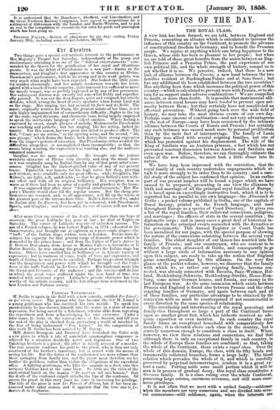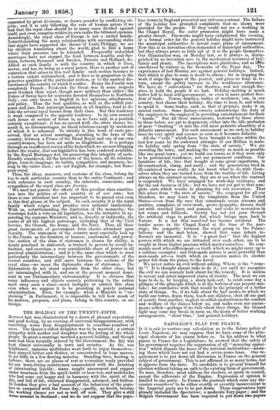TOPICS OF THE DAY.
THE ROYAL CLASS.
A raw link has been formed, we are told, between England and Prussia, cementing an alliance which is calculated to increase the influence of this country on the Continent, to promote the advance of constitutional freedom in Germany, and to benefit the Prussian people. We rejoice at anything which can bring happiness to the Queen, whose rule has been so pleasant to her people ; but when we are told of these great benefits from the union between an Eng- lish Princess and a Prussian Prince, the past experience of our own political life, and the whole strength of history, compel us to ask whether it is so. We perceive, indeed, that there is a new link of alliance between the Courts, a new bond between the two families resident at Buckingham Palace and at Sans Souci ; but has any additional tie been established between the two countries ? Has anything been done which increases the political power of this country—which is calculated to prevent wars with Prussia, or to ob- tain for us support under adverse combinations ? We are compelled to doubt, or more than doubt. It is possible that matrimonial alli- ances between royal houses may have tended to prevent open ani- mosity between them ; but they certainly have not constituted an effectual prevention. Without going back over the wide field of history, we may take the most obvious events of our own day. Perhaps some amount of combination—and not very advantageous to the rest of Europe—may have been occasioned by the intimate alliance between the Courts of Russia and Prussia ; but certainly any such intimacy was caused much more by personal predilection than by the mere fact of intermarriage. The family of Louis Philippe was allied with several reigning families, not one of which has protested against his displacement. The Wife of the King of Sardinia was an Austrian princess, a fact which has not prevented constant dissension between Austria and Sardinia and even open war. Before, therefore, we can thoroughly estimate the value of the new alliance, we must look a little closer into its nature.
We have long been impressed with the conviction, that the royal family of each country undertakes engagements which at- tach it more strongly to its order than to its country ; and a care- ful study of the subject has confirmed that opinion. In an earlier part of our present number will be found a paper which we have caused to be prepared, presenting in one view the alliances by birth and marriage of all the principal royal families of Europe : it is based upon an exceedingly instructive book, which it is to be o has no parallel in our own language—the Alnurnach de
otha ; a pocket volume published in Gotha, one of the capitals of Ducal Saxony, printed in the French language, and used throughout Europe as a species of Court Directory. It gives you a list of the royal families, their collateral connexions, pedigrees, and marriages ; the officers of state in the several countries • the diplomatic corps ; and in many cases a great deal of historical in- formation on the principal events connected with the dynasties or the governments. This Annual Register or Court Guide has been moralized for our pages, with the special purpose of showing the nature of the connexions subsisting between the several royal families. The eldest daughter of our Queen has married into the family of Prussia ; and our countrymen, who are content to be without their own Almanach de Gotha, and consequently to go without a large circle of information necessary to any opinion upon this subject, are ready to take up the notion that England gains something peculiar by this alliance. On the very first glance at the pocket volume, however, we discover that the family with which we, or rather our reigning family, become con- nected, was already connected with Bavaria, Saxe-Weimar, Hol- land, Mecklenburg-Schwerin, Mecklenburg-Strelitz, Hesse-Hom- burg, some minor German houses, and Russia, our enemy in the last European war. As the same connexion which exists between Prussia and England is found also between Prussia and the other reigning families of Germany, and again between each and all of those families, any particular advantage to be obtained by the connexion with us must be counterpoised if not counteracted in every direction by the same species of relationship. This interlacing and interweaving of the royal genealogy, and family-ties throughout so large a part of the Continent flutes upon us another great fact, which has hitherto received no ade- quate exposition or even mention. In each country the royal family forms an exceptional household with comparatively few members ; it is elevated above each class in the country, but is scarcely numerous enough to constitute a class in itself. When, however, we view these relations and connexions, we find that although there is only an exceptional family in each country, the whole of Europe these families are combined ; so that, taking the whole of the Continent, there exists a royal class. Over the whole of this domain, Europe, the class, with its fifty heads and innumerable collateral branches, forms a large body. The blood relation which pervades the whole of it, and which is carefully preserved by perpetual intermarriages, renders it to a great ex- tent a caste. Putting aside some small portion which it will be seen is in process of gradual decay, this royal class constitutes a German family. It is a class ruling over the whole Continent, possessing large estates, enormous revenues, and still more enor- mous privileges. It is not often that we meet with a united family—seldomer when the members are very numerous and are divided into seve- ral connexions—still seldomer, again, when the interests are
separated by great divisions, or drawn asunder by conflicting ob- jects ; and it is only following the rule of human nature if we find that the royal class should be in many cases divided against itself, and even comprise within its own ranks the bitterest enemies. Accordingly, the royal class of Europe is not a united family. Notwithstanding the many relationships with surrounding states that might have supported the throne of Louis Philippe, we see his children wandering about the world, glad to ftd a home where their presence can be tolerated. Frequently redoubled marriages have not stopped the feud between Austria and Sar- dinia, between Denmark and Sweden, Prussia and Holland, ecc. Allied as each family is with the country in which it lives, moves, and has its being as a royal power, there is another sort of separation that arises in this vast family : each section becomes to a certain extent nationalized, and it does so in proportion to the generous qualities of the particular section, or to the marked dis- tinctions of the country in which it resides. Henry the Fourth was completely French ; Frederick the Great was in some respects more German than royal, though more military than either; the Dukes of Savoy have for centuries devoted themselves to Northern Italy ; our own Queen is English in her opinions, attachments, and policy. Thus the best qualities, as well as the selfish pur- poses and jars that interrupt harmony in all families tend to di- vide the several royal houses from their class. But this tendency is weak compared to the opposite tendency. In its own country each house or section of house is, as we have said, in a position entirely exceptional: it has no accord with the other classes be- neath it, no intermarriages, no blood relations except by accidents of which it is ashamed. So strictly is this bond of caste pre- served, that an actual marriage, according to the laws of the country, between a Prince of the Blood Royal and one of our own countrywomen has been set aside as illegitimate. It is perhaps through an insufficient surveyof the facts which we are nowbrmging before the reader, that our legislation has been rendered available, by the Royal Marriages Act, for preserving this integrity of caste. Broadly considered, all the interests of the house, all its relation- ships even its language, its habits, sympathies, and manners, be- long relation- ships, the entire class ; are not English, for example, but Euro- pean-royal.
Thus, the ideas, manners, and customs of the class, belong far less to each particular country than to the entire Continent ; and with reference to each country, the interests, connexions, and sympathies of the royal class are foreign. We need not pursue the effects of this peculiar class constitu- tion into the politics of each country or of our own ; but there is one attendant fact too important to be passed over even in this first glance at the subject. In each country it is the royal family which reigns and presides over national institutions. With us, notwithstanding the limitation of the monarchy, the Sovereign holds a veto on all legislation, has the initiative in ap- pointing the supreme Ministers, and is, directly or indirectly, the centre of -all the highest patronage, including that of the Civil Service, the Church, the Army, and the Navy. Thus all those great instruments of government form classes attendant upon Royalty. The statesmen of the country most especially look up to the Crown as the fountain of honour, emolument, and power. One section of the class of statesmen is chosen for ability, is deeply practised in statecraft, is trained to govern by occult in- fluences, and exercises a very considerable share of power in all practical administration; and it is the same class which is most particularly the intermediary between the governments of the several countries, and still more between the sections of the royal class—we mean the diplomatic class of statesmen. The diplomatists do not stand separate from the other class, but are intermingled with it, and are at the present moment domi- nant in our Parliamentary statesmanship. It is obvious that many influences and objects scarcely pertaining to the nation must sway such a class—must instigate or control this class even when we suppose it to be presiding in purely national administration. Even, for example, when a Minister is " ex- plaining " in Parliament, it is impossible to tell how much of his motives, purposes, and plans, belong to this country, or are foreign.



























 Previous page
Previous page